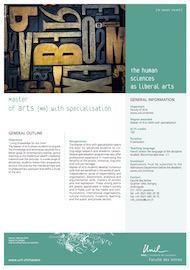Master of Arts (MA) with Specialisation
Presentation
The Master of Arts allows students to acquire the knowledge and techniques required for a better grasp of of the contemporary world and of cultural production over time.
The Master’s course offered by the Faculty of Arts a wide range of disciplines, from historical studies to theoretical approaches in the human sciences, languages and literature.
The specialisation programmes are study plans worth 30 ECTS credits that, when added to the Master of Arts course, allow to obtain a Master of Arts with Specialisation. Through an interdisciplinary approach, they offer the possibility, as the case may be, to deepen your knowledge in a particular field, to get acquainted with academic research or to acquire a professionalising experience.
The Master of Arts degree offers training in the following disciplines:
- Classical Studies
- Computer Science for the Humanities
- English
- French as a Foreign Language
- German
- History
- History and Aesthetics of Film
- History of Art
- History of Religions
- Italian
- Linguistics
- Medieval French
- Modern French
- Philosophy
- Slavic Studies
- Spanish
- South Asian Languages and Cultures
At the end of the first year, you will choose the discipline in which you wish to write your dissertation, and this will then become your main discipline. You will also decide whether you are aiming for a Master of Arts for 90 ECTS, or a Master of Arts with a specialisation, for 120 ECTS.
Specialisation programmes
- African Studies: Textwork and Fieldwork
- Comparative European Languages and Literatures
- Culture, Civilisation and Resurgences of the Middle Ages
- Theatre Studies
- Education and Outreach Practices
- Focus on Interculturality
- French and French-Speaking Studies in the European Context
- History of Culture: texts, images and society
- History of Film Theory/Practice
- History of the Book and Critical Edition
- Literary Translation
- New American Studies
- Public Discourse and Communication Analysis
- Switzerland and the Arts: Boundaries, Territories, Identities
- Working in the Field of Archaeology and Historical Heritage
Organiser
Faculty of Arts
Degree awarded
Master of Arts (MA) with specialisation
ECTS credits
120
Duration
4 semesters
Teaching language
French and/or the language of the discipline studied. Recommended level: C1.
Admission requirements
Holders of a Bachelor of Arts degree of the University of Lausanne, or of another Swiss or foreign university recognised by UNIL, are admitted without conditions to the Master of Arts degree course in the discipline(s) studied for their Bachelor’s degree.
Students who change discipline between the Bachelor’s degree and the Master’s degree, or are holders of a Swiss or foreign Bachelor’s degree recognised by UNIL in another orientation are admitted to the Master’s degree on the basis of their personal case files. They may be required to complete a catch-up programme.
In order to be admitted to a Master’s course at UNIL, holders of a Bachelor’s degree awarded by a UAS must prove that they satisfy the conditions for admission to a Master’s degree course in their own type of educational institution.
Enrolment and final dates
It is possible to start the programme of the Master of Arts degree in either the Autumn or the Spring semesters.
Applications to be submitted before 30 April (autumn semester) or 30 November (spring semester) to the Admissions Office: www.unil.ch/immat
Candidates needing a visa to study in Switzerland must apply for enrolment at least two months prior to the deadlines indicated above.
More information
Course description of the Master of Arts degree
Course description of the specialisation programmes
Timetables
Thanks to the possibility of completing a work placement, this course offers you the chance to familiarise yourself with various areas of the arts (museums, theatres, festivals and foundations), communications, the media, events, translation, publishing, archives, cultural mediation or international organisations.
By the end of the course, you will have acquired skills that are useful in a range of occupations, from the ability to analyse and summarise, to a critical mindset, a rigorous approach to interpretation, independence, organisation, argumentation, excellent oral and written communication, and the ability to convey complex knowledge.
These assets are greatly appreciated and allow our alumni to have positions such as teacher, journalist, communications officer, editorial coordinator, cultural mediator, trans- lator, web and new media projects officer, arts festival programme coordinator.
Subject to changes.
The French version prevails. Only the official texts should be considered binding.
Last update: 26 March 2024
Presentation of the specialisations (in French)
Public Discourse and Communication Analysis
Culture, Civilisation and Resurgences of the Middle Ages
French and French-speaking Studies in the European Context
African Studies: Textwork and Fieldwork
History of the Book and Critical Edition
Working in the Field of Archaeology and Historical Heritage
Switzerland and the Arts: Boundaries, Territories, Identities
History of Culture: Texts, Images and Society
History of Film Theory/Practices
Contact
Study Advisor
M. Yvan Bubloz
Quartier UNIL-Chamberonne
Anthropole 2050
CH–1015 Lausanne
Tél. +41 21 692 28 93

